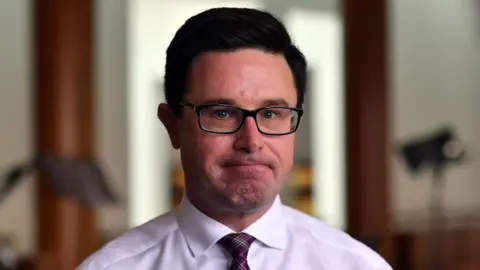Australia's Liberal-National coalition splits after election thrashing
 Getty Images
Getty ImagesAustralia's conservative Liberal-National coalition - the nation's main opposition political party - has split after a partnership lasting almost 80 years.
The move marks a seismic change in the country's political landscape and comes just weeks after a federal election that saw Labor win a second term in a landslide victory.
Nationals leader David Littleproud on Tuesday said his party was not re-entering a coalition agreement, amid policy disagreements with the Liberal Party as it goes on a journey of "rediscovery" following the empathic loss.
Littleproud added that the Coalition has been broken and repaired before, and he hoped that - with time - the parties could reconcile again.
The Liberal Party - which has the second largest number of seats in parliament - will remain the formal opposition party, though now in their own right. This means the Nationals will not hold any opposition roles.
All except one of the 15 electorates the Liberal-National coalition lost at the election were ceded by the Liberals, who saw big swings against them right around the nation.
Support nosedived in more moderate areas, particularly in cities, which analysts largely put down to then-leader Peter Dutton's polarising persona and some Trump-like policies. His successor, Sussan Ley, has vowed to bring the party back to the centre-right.
The split comes after days of post-election talks between the Liberals and Nationals on what their future would look like, with Littleproud's party - who mainly represent regional communities and often have more conservative policy positions - failing to reach an agreement with their long-time political ally.
A key issue that had strained their relationship with the Liberals was climate and energy, with sects of the National Party still opposed to net-zero emissions goals, and wedded to a nuclear power proposal which proved controversial at the election.
Littleproud also pointed to regional infrastructure spending and policies to improve supermarket competition as points of conflict.
Describing it as "one of the hardest political decisions of his life", Littleproud said he had a "respectful conversation" with Ley to inform her of the split on Tuesday morning.
"What this is about is taking a deep breath and saying to the Australian people, this is time apart [for] us to be better, [to] focus on them."
"I gave [Ley] the commitment that I'll work with her every day to help to try to rebuild the relationship to the point we can re-enter a coalition before the next election."
However, he said the National Party would contest the next election solo if unity could not be achieved.
The Liberal-National partnership, which in its current form dates back to the 1940s, has broken down and been re-established several times over the decades. The last time the Coalition split was almost four decades ago, in 1987.
